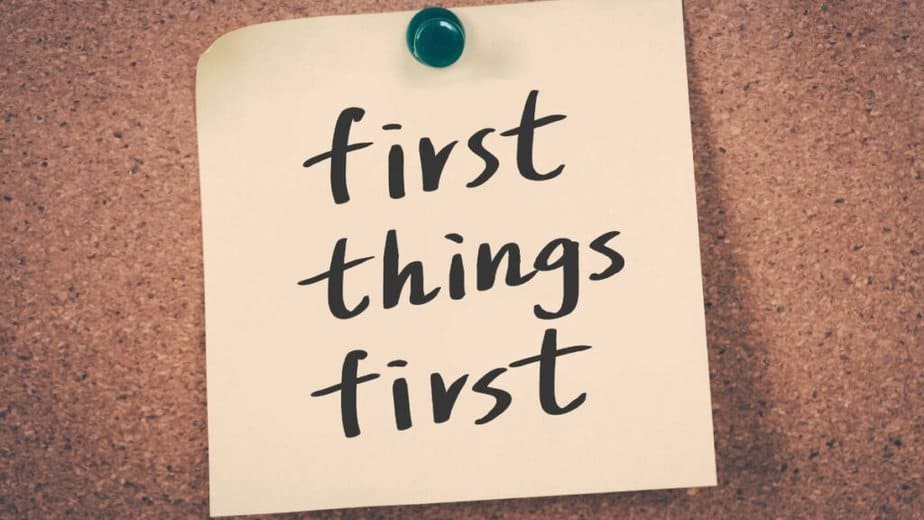Let’s talk about goals. Not just any goals, but the kind that sticks, that means something. You see, in a world buzzing with noise and distractions, setting goals is like plotting a course through uncharted waters. It’s more than ticking boxes or crossing the finish lines. Setting meaningful goals is about crafting a journey that’s uniquely yours, one that aligns with who you are and who you want to be.
Focus forward is not just a catchy phrase; it’s a way of thinking, a method to set goals that are as meaningful as they are achievable. Goals that light up your path, not just add to your to-do list.
We’re diving into the art of setting life goals that resonate with your deepest values and aspirations. We’re talking about goals that give you direction and bring clarity and purpose to your everyday hustle. Because when your goals are clear, your actions become meaningful, and your life becomes a story worth telling.
Read “Simplify to Magnify,” “First Things First,” and “Clear Space, Clear Mind.” Setting goals is crucial for success, but these articles will guide you to create more meaningful ones.
So, let’s get started.
The Power of Focused Goals
Focused goals guide, direct, and keep us on track. They’re not the same as those everyday wishes or vague dreams we all have. Focused goals are sharper, clearer, and they have a purpose.
When your goals are focused, your actions have direction. You’re not just wandering; you’re on a mission. This kind of clarity cuts through the noise of daily life. It silences the ‘shoulds’ and the ‘maybes,’ leaving you with a resounding ‘must.’
They simplify. With a clear goal, decision-making becomes easier. Does this action help me reach my goal? If not, it’s likely a distraction. This simplicity is powerful. It removes the clutter from your path, making your journey towards your goal more straightforward and less stressful.
Focused goals keep you motivated. When you know exactly what you’re aiming for, each step you take feels meaningful. Each small victory, each hurdle crossed, connects directly to that bigger picture. It’s like watching the pieces of a puzzle come together. Suddenly, what you do every day isn’t just routine; it’s part of a larger, exciting story.
Focused goals transform how you move through life. They turn your journey into one of purpose and intention. And when you move with purpose, the impact of your actions magnifies. You’re not just busy; you’re making real, tangible progress. That’s the true power of focused goals.
Written Intentions
Writing focused goals means aligning intentions. This year, I’m not just improving but elevating my goals. Same direction, different level of play. I will multiply my usefulness.
Identifying What Matters Most
Before you set your goals, stop. Take a moment. Ask yourself, “What really matters to me?” Dig deep, beyond the surface of everyday wants and into the core of your true desires and values.
Start by looking inward. Reflect on moments when you felt truly fulfilled, truly alive. What were you doing? Who were you with? These moments are clues to what matters most to you. They reveal your passions, your strengths, and your values.
Identifying what matters most is not just about the big achievements or the accolades. It’s about what stirs your heart, what gets you out of bed in the morning with a spark in your eyes. For some, it’s creativity; for others, it’s helping people, building something, solving problems, learning, or exploring.
Your goals need to align with these core values. Why? Because goals that are in harmony with your true self are the ones that stick. They feel less like chores and more like missions. They energize you, drive you, and keep you going, even when the going gets tough.
So, take that time to understand yourself. Uncover your values and passions. And then, when you set your goals, make sure they are a reflection of these discoveries.
Goals are gifts.
Our priorities shift as we grow. The goals I set five years ago no longer ignited my passion, but they mattered to the person I was then. They’ve molded me into who I am today. Now, my present goals are my gifts to my future self.
Great leadership isn’t an event—it’s a habit. Get actionable leadership habits every Monday and Thursday.
Setting SMARTER Goals
SMARTER goals – Specific, Measurable, Achievable, Relevant, Time-bound, Engaging, and Rewarding. This is not just a checklist; it’s a formula for creating goals that not only lead to success but also bring joy and fulfillment along the way.
Specific. Start by getting specific. Vague goals are like shadows; they’re hard to catch. But when you’re specific, you know exactly what you’re chasing. For example, instead of saying, “I want to be healthier,” say, “I will incorporate a 30-minute workout into my daily routine.”
Measurable. How will you know you’ve reached your goal? Make it measurable. If your goal is to improve your skills, decide how you’ll measure that. Maybe it’s by completing a specific course or mastering a particular technique by a certain date.
Achievable. Your goal should challenge you, but also be within reach. Think about what’s realistic for you right now. Want to start a business? Start by setting a goal to research and write a business plan. It’s about building bridges, not leaping chasms.
Relevant. Make sure your goals align with your values and long-term objectives. If creativity is your passion, setting a goal to learn a new creative skill makes sense. It’s about ensuring each step moves you closer to your larger life picture.
Time-bound. Set a deadline. It’s your line in the sand. It creates a sense of urgency and helps you focus. If you want to learn a new language, set a date for when you’ll start conversing fluently. Deadlines turn dreams into goals.
Engaging. Here’s where we often miss the mark. Your goals should excite you, and spark something inside you. If you’re passionate about the environment, set a goal to start a community recycling program. Choose goals that engage your interests and passions.
Rewarding. Lastly, the reward. Your goals should lead to a sense of accomplishment and satisfaction. When planning your goals, think about how achieving them will feel. Will finishing that marathon fill you with pride? Will launching your website ignite a sense of achievement? That’s the reward.
SMARTER goals are about creating a roadmap for a journey that’s both successful, enriching, and fulfilling. By following these steps, each goal you set becomes a stepping stone to a more engaged, rewarding life.
Example 1: Financial Goal – Saving 100,000 Pesos in One Year
- Specific: Save 100,000 pesos within one year.
- Measurable: Track savings monthly, aiming for approximately 8,333 pesos per month.
- Achievable: Review and adjust the budget to find areas to cut expenses and increase savings. Consider additional income sources if necessary.
- Relevant: This goal supports long-term financial stability and potential future investments.
- Time-bound: Set the deadline one year from now.
- Engaging: Make the process engaging by charting progress visually and celebrating small milestones, like every 10,000 pesos saved.
- Rewarding: The reward will be achieving a significant savings milestone, providing a sense of financial security and accomplishment.
Example 2: Writing a Non-fiction Book on Public Speaking in Six Months
- Specific: Complete a manuscript for a non-fiction book on public speaking.
- Measurable: Break the project into chapters and set mini-deadlines for each. Aim to write a certain number of words or pages weekly.
- Achievable: Allocate specific times for writing each week. Research and outline the book in the first month to streamline the writing process.
- Relevant: This goal aligns with a passion for public speaking and a desire to share knowledge and expertise with others.
- Time-bound: Finish the manuscript in six months.
- Engaging: Keep the project engaging by including personal anecdotes, interviewing other public speaking experts, or adding interactive elements to the book.
- Rewarding: The reward will be the completion and potential publication of a book, establishing oneself as an authority in public speaking and contributing valuable insights to others.
Both examples demonstrate how the SMARTER goals framework transforms general desires into structured, motivating, and achievable objectives, leading to personal and professional growth.
Breaking Down Big Goals into Actionable Steps
Big goals can be daunting, like mountains looming in the distance. But every mountain can be conquered one step at a time. Breaking down these goals into smaller, actionable steps makes them more manageable and less intimidating. Here’s how you do it:
Start with the end in mind. Visualize the final outcome of your goal. What does success look like? For instance, if your goal is to write a book, envision holding the finished book in your hands. This vision gives you a clear target to work towards.
Create a Roadmap. Work backwards from your end goal. What major milestones need to be achieved along the way? If you’re saving 100,000 pesos, milestones could be every 20,000 pesos saved. For writing a book, it could be completing each chapter.
Break it down further. Take each milestone and break it down into even smaller tasks. What do you need to do each month, each week, each day? These should be simple, achievable tasks. For your savings goal, it might be setting a weekly budget; for your book, writing a set number of words daily.
Set mini-deadlines. Assign deadlines to each small task and milestone. Deadlines create urgency and help keep you on track. They’re little checkpoints on your journey to the big goal.
Monitor and adjust. Regularly check your progress. Celebrate when you complete tasks and reach mini-milestones. If you find yourself falling behind, don’t get discouraged. Adjust your plan and deadlines as needed.
Stay flexible. Be prepared to adapt. Life is unpredictable, and your plan might need tweaking as circumstances change. The key is to stay committed to the goal, even if the path to get there shifts a bit.
By breaking down your big goals into smaller, actionable steps, you turn what seemed like a marathon into a series of short, manageable sprints. This approach keeps you motivated, as each small accomplishment fuels your drive to reach the next.
And before you know it, that mountain you were facing becomes a series of manageable hills, each one a step closer to your summit.
Goals are like GPS
Breaking down goals needn’t be overly detailed; it’s not about crafting an intricate map. Think of it as using a GPS system. It helps you gauge your progress, showing how far you’ve come and guiding you toward your next crucial step.
Overcoming Obstacles and Staying Flexible
In your journey towards your goals, think of obstacles as detours, not roadblocks. They’re inevitable, but they don’t define your journey’s end. It’s how you navigate these challenges that shape your path to success.
Here’s how to tackle obstacles and stay flexible:
Expect challenges. First, accept that obstacles are a natural part of the process. Whether it’s unexpected expenses when saving money or writer’s block when penning your book, challenges don’t signal failure; they’re opportunities for growth and learning.
Stay calm and analyze. When faced with a hurdle, take a step back. Panic blurs thinking. Assess the situation calmly. What is the obstacle exactly? Is it a temporary setback or a sign you need to adjust your approach?
Seek solutions, not excuses. Focus on finding solutions. This might involve some creative thinking or seeking advice from others. If your savings are off track, look for new ways to cut expenses or boost your income. If your writing stalls, explore new sources of inspiration or change your writing routine.
Be willing to adjust your plan. Flexibility is key. Sometimes, the original plan needs tweaking. This isn’t a failure; it’s smart strategy. Adjust your timelines, set new mini-goals, or even redefine your end goal if necessary. The goal is progress, not perfection.
Learn from each obstacle. Every challenge has a lesson. If a particular strategy didn’t work, ask why. Understanding what went wrong helps you avoid similar pitfalls in the future. It’s about building resilience and wisdom as you move forward.
Keep Your eyes on the prize: Remind yourself why your goal is important to you. This keeps motivation alive, even when the going gets tough. Your ‘why’ is your anchor, keeping you steady in rough seas.
Overcoming obstacles and staying flexible are crucial skills in goal achievement. They’re about adapting, learning, and persisting. Remember, your path to any goal is uniquely yours. It may twist and turn, but with resilience and adaptability, you’ll navigate your way to success.
Regular Review and Adaptation
Regularly reviewing and adapting your goals is like recalibrating your compass on a long journey. It ensures you’re still headed in the right direction and allows you to make necessary adjustments.
Here’s how to effectively review and adapt your goals:
Set review milestones. Just like your goals, your reviews should be scheduled and structured. Set aside time monthly or quarterly to assess your progress. This regular check-in keeps you accountable and focused.
Measure your progress. During each review, measure your progress against your set milestones. How close are you to saving that 100,000 pesos? How many chapters of your book have you completed? Use these metrics to gauge how well you’re doing.
Reflect on the journey. Ask yourself some key questions. What’s working well? What isn’t? Are there new challenges you didn’t anticipate? Reflecting on these questions helps you understand the effectiveness of your current approach.
Adapt as needed. Based on your review, be ready to make changes. Maybe you need to adjust your savings strategy, or perhaps your writing schedule needs to be more flexible. The goal is to find the best path forward, even if it’s different from your initial plan.
Stay open to change. Sometimes, your goals themselves may need to change. Life can throw unexpected twists, and what seemed important six months ago may not be as relevant now. It’s okay to redefine your goals to fit your current reality.
Celebrate progress, not just completion. Don’t wait until you’ve reached your final goal to celebrate. Recognize the progress you’ve made in your regular reviews. Celebrating small wins keeps you motivated and acknowledges the effort you’ve put in.
Regular review and adaptation are about staying dynamic and responsive. It’s understanding that the path to your goals may evolve, and that’s perfectly fine. You
Focus Forward
Setting goals is much more than just a to-do list for the future. It’s about carving out a path that reflects who you are and who you aspire to be. It’s about journeying through life with intention and purpose.
The journey to your goals is unique to you. It’s not a straight line; it’s a path filled with learning, growth, and sometimes, redirection. Embrace this journey with an open heart and a curious mind. Celebrate each step, learn from every challenge, and stay flexible in your approach.
Your goals, whether saving a significant sum of money, writing a book, or anything else, are more than just endpoints. They’re stepping stones in your personal story, chapters in the book of your life. So, set your goals with conviction, pursue them with passion, and enjoy every moment of the journey.
As you move forward, keep focusing forward. Let your goals light up your path, guiding you towards a life that’s not just successful, but also meaningful and deeply fulfilling.
Simplify to magnify.
Next: The Rhythm of Routines: Structuring Your Day for Impact







